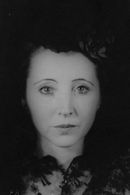Anaïs Nin was born on February 21, 1903, in Neuilly-sur-Seine, a suburb of Paris, France. She moved to the United States in 1914 with her mother, Rosa Culmell, and two brothers, Thorvald and Joaquin. Her father, Joaquin Nin, a Spanish pianist and composer, abandoned the family after leaving his family at various intervals in his career to tour Europe and Cuba, when Nin was eleven.
Nin began her childhood diary, "Linotte", written as an extended letter to her papa, on the boat Monserrat. She wanted to be an artist from the very moment she could speak. She loved books, stories, artists, musicians, fine music, good food, and grew accustomed to being surrounded by the sounds of late night bohemian laughter from her parents' dinner parties heard from the downstairs parlor before the two were separated.
Anaïs was a model for her father's early photographs at this time and used to steal into his study when he was away and read all his books voraciously. She was seriously ill as a child and nearly died twice from various internal organ afflictions. If not for a kind Belgian couple and the care of three Belgian nurses, Anaïs Nin might never have made the impact on literature and the feminist movement that she did later on in life.
In New York, Anaïs loved writing in her diary, dreaming, philosophizing, and recording her thoughts and reflections as she grew into a beautiful young woman with grand dreams and a host of insecurities. She had an active imagination and preferred rainy days of reading curled up with a wonderful book or her diary at the little windowsill seat - and she loved to dance and had a connection to nature heavily influenced by poets like Byron, Blake and the New England Transcendentalists.
Her Catholic faith wavered in and out due to philosophical doubts about the meaning of life and suffering, caused by her anguish over her beloved war-torn France and the deep rift felt inside her since being uprooted.



























